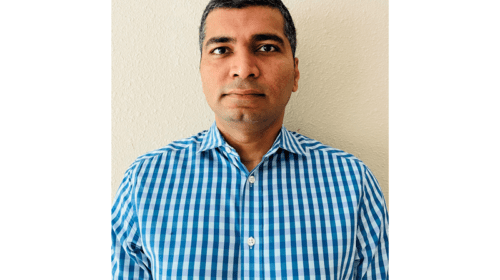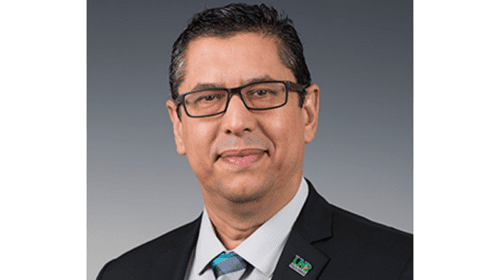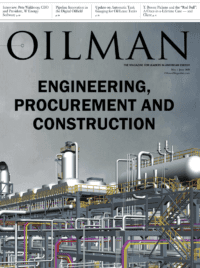Oilman is featuring and highlighting young professionals who are trailblazing their way through the ups and downs of the oil and gas industry, how they found their way to the career, and how they contribute to the industry. In this section, we’ll also see their perspective and advice to students. Our first young professional is Anthony Blanker, who is a reservoir engineer at ExxonMobil in Houston. He’s a graduate of Penn State with a degree in petroleum engineering, experience in the North Dakota oilfields, and is active with the local SPE chapter.
Alan Alexeyev: What inspired you to start a career in the oil and gas industry? How did you decide on becoming a petroleum engineer?

Anthony Blanker: The realization that I wanted to be a part of the energy industry, particularly oil and gas, became apparent toward the end of high school in 2014 when I was asked, “What do you want to be when you grow up?” I’ve always had the desire to complete challenging yet rewarding tasks, work with revered and brilliant individuals on a day-to-day basis, and have the opportunity to work around the world. A career in the oil and gas industry is one in which I can utilize my industry related experience, multicultural Brazilian and American background, and drive to add value in a dynamic industry that I am lucky to be a part of.
AA: What advice or main takeaways do you provide to students who have an interest in the oil and gas industry?
AB: I would propose that you find a profession where you truly love what you do. One quote that I always revisit is, “Your work is going to fill a large part of your life, and the only way to be truly satisfied is to do what you believe is great work. And the only way to do great work is to love what you do.” The oil and gas industry is cyclical, dynamic, and ever changing; however, if you show unwavering passion, the desire to learn and grow as a young professional, there will always be a place for you in this industry.
AA: Has the industry taken initiatives to smoothly transition young professionals into the oil sector? What, if anything, could be done better?
AB: Two ways that prepare and mold students to enter the workforce are industry related internships/co-ops and being actively involved with the Society of Petroleum Engineers (SPE). If provided the fortunate opportunity to work in the industry prior to graduation, treat this as a once in a lifetime opportunity where you get a real glimpse of what it takes to be a part of such a dynamic and demanding industry. Along with the insurmountable experience you will gain, and the vast amounts of people you will meet during a short summer or semester, it also provides the opportunity to see if this is where your true interests lie and serve as an extended job interview where you hopefully land a full-time position. I would also greatly suggest to get involved with your local SPE chapter if you are not already. Through SPE, I’ve been blessed to network with extraordinary people, absorb a wealth of information through conferences and technical talks, and fortunate to grow my leadership skills by serving on the Student Chapter of SPE at the Pennsylvania State University.
AA: In your opinion, does an individual’s transition from another industry to the oil and gas industry provide difficulty or opportunity, such as a diverse perspective?
AB: The transition from any industry can prove to be difficult; however, it’s comforting to know that we all start as a green hat and can learn and fine tune our skills to any job presented before us. I think people migrating from the tech sector have a huge opportunity to prosper in the oil and gas industry. A saying that is common among the industry is, “Don’t re-invent the wheel” or “If it’s not broke, don’t fix it” and I adamantly disagree that this should be the status quo in our current market. Our industry has vast potential and must be ready to incorporate big data, machine learning, and automation. If a process or asset can be optimized and increase value while reducing inefficiencies, then it is apparent that these measures should be taken. We cannot be complacent and watch innovation pass us by. People from different industries can provide diverse ideas, an unbiased approach, and innovative takes on current processes or technology that have “been around since the wheel was invented.”
AA: As you communicate with students on a regular basis, would you say there is an increased interest among younger individuals to start a career in the oil and gas industry, in comparison to the past?
AB: This is a great question; however, tough to answer. It is apparent that the number of students who declare to study Petroleum Engineering declines year over year; however, I do believe that the passion of those students who have decided to pursue a career in the oil and gas industry increases more than ever. Given the current job market, along with oil prices hovering around $30/bbl, it will take a tenacious and go-getter attitude to enter and succeed in such a competitive industry. The demand to enter the industry is less than that of graduating students in 2008 when oil prices were peaking at $140; however, due to the cyclical nature of our industry, this demand will be sure to rise in due time as markets realign and the industry picks up activity once again.
AA: How accepting do you think traditional industries, like oil and gas, are of younger generations of workers? Do you think more young adults should be a part of this industry?
AB: I personally believe our industry is one of the most welcoming industries in terms of welcoming new waves of students into the work force. I am blessed to say, so far, I have experienced nothing but welcoming mentorship and candid feedback from fellow colleagues during my transition from school to the work force. It is key that students continue to be a part of the oil and gas industry as the demand for energy will only continue to rise in the future. The influx of new ideas and diversity that new students bring to an old industry are required for our industry to adapt to the ever-changing future.
Alan is a graduate from the University of North Dakota with a Master's degree in Petroleum Engineering. He previously earned his BA in Mathematics from the University of Houston and a BS in Petroleum Engineering from the University of Wyoming. Alan is an active SPE member and has presented at petroleum conferences and exhibitions.













